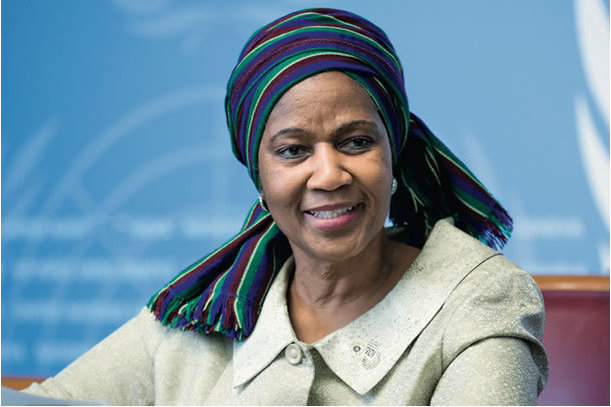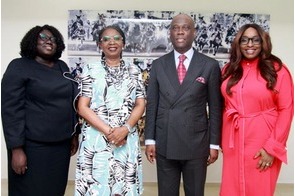UN report says women are left out of COVID-19 response, recovery

Summary
Nigeria has a total of 18 COVID-19 response measures, 10 of which are gender-related.
The COVID-19 Global Gender Response Tracker launched on Monday by the United Nations Development Programme (UNDP) and UN Women shows that social protection and jobs response to the devastating pandemic has largely overlooked women’s needs. The tracker reveals that most of the world’s nations are not doing enough to protect women and girls from the economic and social fallout brought on by the COVID-19 crisis.
The tracker, co-created and coordinated by UNDP and UN Women, was launched at a side event at the 75th session of the UN General Assembly (UNGA 75) in New York. Designed to monitor policy measures enacted by governments worldwide to tackle the COVID-19 crisis, the tracker highlights responses that have integrated a gender lens in three areas, namely violence against women and girls (VAWG), support for unpaid care work, and strengthening women’s economic security.
According to a statement by the two UN entities sent to Financial Nigeria, only one in eight countries worldwide have measures in place to protect women against the social and economic impacts of the pandemic. Out of 2,517 measures implemented across 206 countries and territories to tackle COVID-19, only 992 (39 per cent) were gender related. 42 countries, 20 per cent of those analysed, have no gender-sensitive measures in response to COVID-19 at all, according to the UNDP and UN Women statement.
“This new gender response tracker can help accelerate policy reform by guiding on gaps in national efforts and funding and highlighting best practices,” said UNDP Administrator Achim Steiner.
Data from the newly-launched tracker shows Europe leads the world with 294 gender-sensitive policies out of 721 measures in response to COVID-19. The continent is also leading the response on addressing VAWG and unpaid care – accounting for almost 32 per cent of all violence prevention measures and 49 per cent of all unpaid care measures.
The Asian region has 206 gender-sensitive measures out of 613 COVID-19 response policies. North and South America has 281 gender-related measures out of 634 COVID-19 measures. The American continent has the largest number of measures aimed at strengthening women’s economic security, followed by Africa. The African continent has 150 gender-related measures from a total of 437 COVID-19 response policies.
According to data in the tracker, Nigeria has a total of 18 COVID-19 response measures. 10 of them are gender-related, out of which four are VAWG measures and six are to strengthen women's economic security. No measure has been instituted in Nigeria to support unpaid care, signalling the country has introduced measures covering only two of the gender-related areas.
In response to the care crisis, Argentina has increased monthly child allowance payments; Australia and Costa Rica have ensured that childcare services remain open during lockdown. Canada, Spain and Republic of Korea, have introduced cash benefits for parents who are affected by school and day care closures. Countries like Togo, Georgia and Morocco are providing cash transfers or grants to women entrepreneurs and informal traders.
“It’s clear that the COVID-19 pandemic is hitting women hard – as victims of domestic violence locked down with their abusers, as unpaid caregivers in families and communities, and as workers in jobs that lack social protection,” said UN Women Executive Director, Phumzile Mlambo-Ngcuka. “The Global Tracker supports governments in making the right policy decisions by sharing good practices and monitoring progress in care policies and measures to address violence against women.”
The UNDP and UN Women – also known as United Nations Entity for Gender Equality and the Empowerment of Women – suggest that even where countries have adopted an impressive number of gender-sensitive measures, these will only be effective if they are adequately financed and sustained over time. The organisations further recommend that services to respond to and prevent VAWG must be treated as essential services. They should also be adequately funded and be an integral part of national and local COVID-19 response plans.
According to Steiner, “the COVID-19 crisis provides an opportunity for countries to transform existing economic models towards a renewed social contract that prioritizes social justice and gender equality.”
The UN organisations advised that fiscal packages must be devised to ensure that women are not left out of the pandemic response and recovery. They also call for governments to support women’s active participation in leadership and decision-making processes in their COVID-19 response and invest in sex-disaggregated data to ensure that the gender-differentiated impacts of the pandemic are recognised and effectively addressed.
Related
-
AWIEF 2025 mobilising stakeholders to recommit to gender equity
AWIEF2025 will convene a vibrant community of entrepreneurs, corporate executives, investors, policymakers, development ...
-
Access Bank wins Women in Marketing and Communications Awards 2020
Access Bank will continue to strive to ensure that women are empowered – Herbert Wigwe.
-
Access Bank promoting gender equality in the financial services sector
The Central Bank of Nigeria recognises the fact that financial access, inclusion and literacy are the cornerstones of ...










